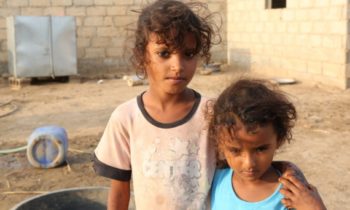 A total of 462,000 children are at immediate risk of death from severe malnutrition. Among the 2.2 million displaced Yemenis, 75 per cent identified food as their top priority.
A total of 462,000 children are at immediate risk of death from severe malnutrition. Among the 2.2 million displaced Yemenis, 75 per cent identified food as their top priority.
Two years since the conflict escalated in Yemen, more than 17 million Yemenis do not know if they will be able to put food on the table to feed their families, the Norwegian Refugee Council warned today at the start of a donor conference for Yemen.
“In Yemen, if bombs don’t kill you, a slow and painful death by starvation is now an increasing threat,” said Norwegian Refugee Council secretary-general Jan Egeland.
“Yemen’s downward spiral means that we will see more shocking scenes of despair, with famine possibly spreading across the country, unless the conflict is ended and the deep economic crisis and aid shortage is reversed,” Egeland said.
A total of 462,000 children are at immediate risk of death from severe malnutrition. Among the 2.2 million displaced Yemenis, 75 per cent identified food as their top priority. Displaced people face a number of hardships, including lack of access to water, healthcare, shelter, education and a basic income. Still, 75 percent identify food as their top priority among all these, illustrating the immediate and desperate need, a daily struggle for survival.
“Since the conflict started, all the warring parties have impeded our ability to reach people who were in most need of humanitarian assistance,” Egeland said. “It is crucial that all restrictions on aid are lifted so that we are able to deliver life-saving services throughout Yemen. All parties to the conflict in Yemen should allow free and clear access to humanitarian agencies, as is required under International Humanitarian Law.”
Devastated economy
A de-facto blockade on imports, imposed by the Saudi-led coalition, has had a devastating impact on the Yemeni economy. Public sector health workers and teachers do not get their salaries. The private sector is collapsing in a country dependent on imports for 90 per cent of its food. The blockade, the violence and restrictions to humanitarian access on the ground, as well as the continued destruction of civilian infrastructure in violation of humanitarian law, is turning Yemen into a country where an entire population soon will be dependent on assistance.
“Over the last years we have shown that we can respond rapidly to needs on the ground, but unless the financial commitments match the response, we will not be able to reach the most vulnerable,” Egeland said. “Last year’s appeal was only 58 per cent funded, limiting our overall response substantially. We appeal today to international donors to step up the funding, but also to apply all the pressure possible on the involved parties to secure peace and a revival of Yemen’s economy.”
(maltatoday)
